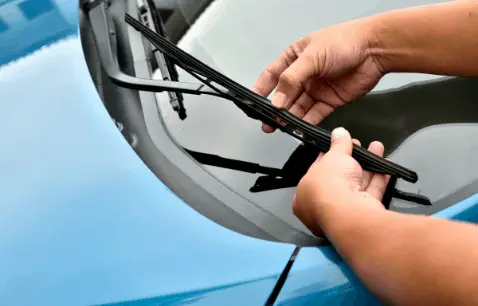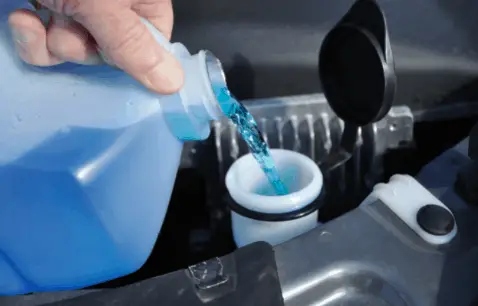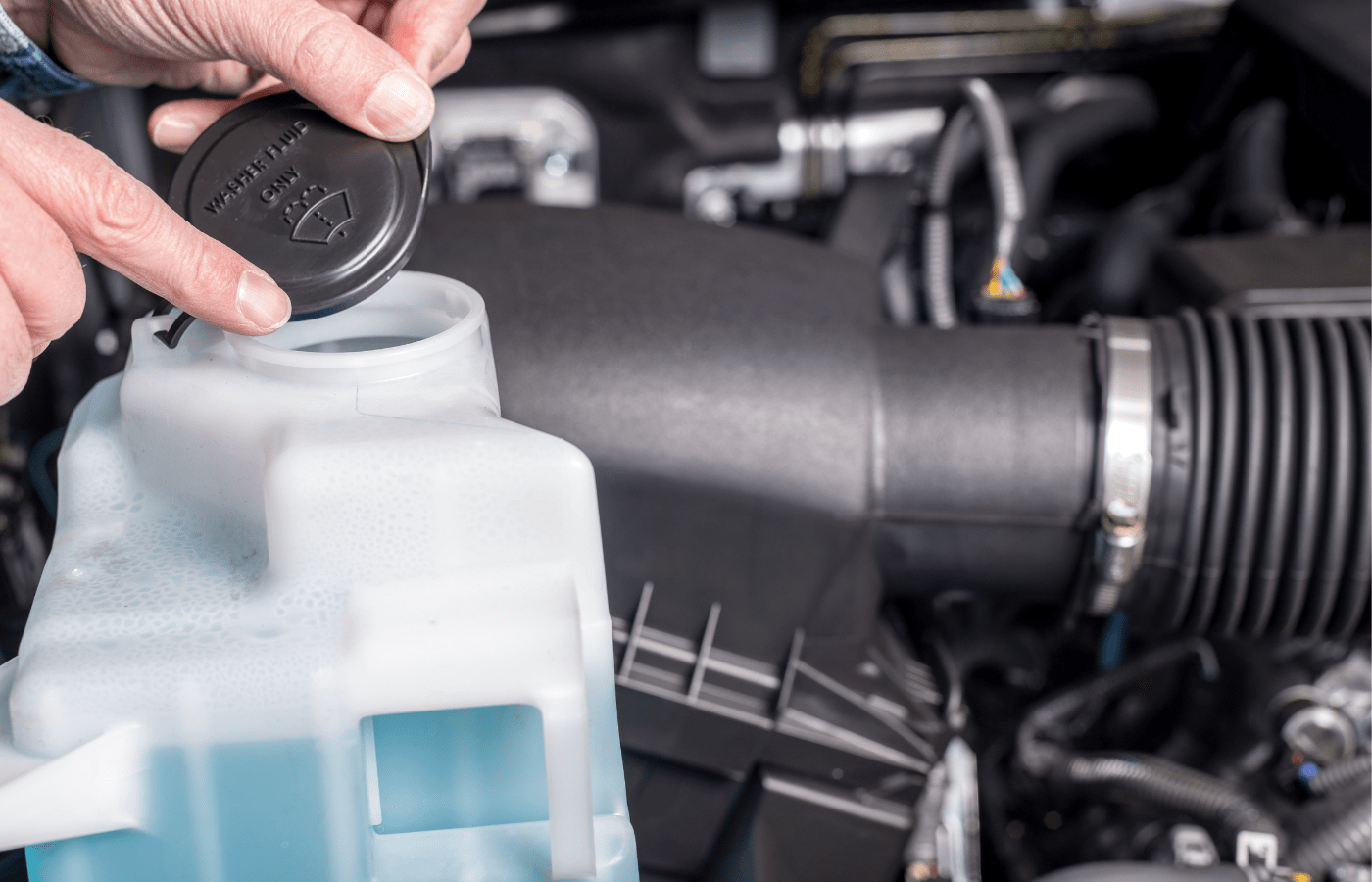As summer approaches us, you’ll begin to see pollen, dust, and bugs build up on your windshield more and more. You engage the sprayer and a spritz of wiper fluid coats your windshield before being swept away with all the built-up grime.
Windshield wiper fluid makes your wipers more effective, but is it really good to use from a long-term perspective? Unfortunately, the chemicals in windshield wiper fluid are bad for several car components, including paint, plastics, and rubber. It can also degrade wax, further exposing your car to the elements and promoting wear on the paint.
If you want to ensure the longevity of your car’s paint job, as well as plastic and rubber components, care should be taken when using windshield wiper fluid. So, what’s in it that’s so bad, and how does it affect your car in the long term? Let’s find out!
What’s in Your Windshield Washer Fluid?
There are a few chemicals that are used in the most windshield wiper fluid. Most commonly they are composed of alcohol-based solvents like methanol, ethanol, and ethylene glycol. These chemicals are used to aid in the removal of dirt, bugs, and other substances that mess up your windshield and obstruct your view.
The stripping effect is desired on the windshield, as it helps you maintain safe driving conditions. However, that effect doesn’t stop at the glass. It gets sprayed around, so naturally, it coats many of the front and side surfaces of your car.
Any exposed materials that react with the chemicals may begin to degrade. With prolonged exposure, significant damage may occur and affect your car’s functionality.
Sadly, many children mistake the toxic chemicals for Kool-Aid or juice and become ill after drinking wiper fluid that was left unattended.
Please take care to secure any toxic fluids you may have laying about, especially when children are around so that future tragedies can be avoided. A worn paint job or some degraded plastic is a small problem when compared to a poisoned child.
We recommend using windshield wiper fluid concentrate like this one from Amazon. You have to mix it yourself, it’s biodegradable, and it does not contain as many harsh chemicals in it like pre-made mixtures.
Will It Mess Up Your Paint Job?
Washer fluid can lead to the degradation of your car’s paint job, both by stripping off wax and exposing the paint to the elements and by directly affecting the paint itself.
One should weigh that balance carefully when determining what to put in your windshield wiper reservoir.
What Kinds of Damage Can Windshield Wiper Fluid Do to Your Car?

What other parts of your car may be affected by wiper fluid being overused? Any plastic or rubber parts may begin to wear down if exposed. The chemicals that are in wiper fluid react with them and cause damage over time. This can lead to parts failing, which can affect the safety of your car.
Parts of your car that may be damaged by windshield wiper fluid include:
- Paint/exterior: Wiper fluidleads to the breakdown of paint on the car, which causes both cosmetic and functionality issues if left unaddressed. Soft paints are the most at risk, but any is susceptible.
- Wiper blades: These rubber parts come in the greatest contact with wiper fluid, so they’re at the highest risk of degradation.
- Plastics: various plastic components of your car may degrade if exposed to the chemicals in wiper fluid, leading to part failure.
Is Windshield Washer Fluid Corrosive?

Windshield wiper fluid contains any of several corrosive chemicals. Corrosive chemicals are chemicals that cause the degradation and breakdown of largely inert materials. This can lead to part failure in the case of car maintenance.
Corrosive chemicals in windshield wiper fluid include:
- Ethanol: Ethanol is the alcohol in beer, wine, and spirits. It acts as a solvent and is corrosive to many materials.
- Methanol: Methylalcohol is another corrosive solvent used in antifreeze and wiper fluid.
- Ethylene glycol: While used in smaller quantities in wiper fluid, it is also highly corrosive and can cause car damage.
Does Windshield Washer Fluid Cause Rust?
Rust is a silent car-killer and should be treated with care when first noticed. Letting car rust has many knock-on effects that can severely or permanently damage your car. But can windshield wiper fluid cause your car to rust?
In short, it can. When wiper fluid corrodes paint, it exposes the metal to the elements. This can lead to rust directly. If the fluid degrades the wax coating your paint first, it may not directly affect the paint. However, exposing paint directly to the elements increases natural degradation of the paint which may lead to rusting.
Rust on a car’s exterior can spread, leading to permanent damage to the chassis and the car’s body. If left unaddressed, this damage can progress to the point that the car is no longer safe to drive. When this happens, a car should be considered undrivable.
Alternatives to Windshield Wiper Fluid
There are a few ways to mitigate the damage that can be done by wiper fluid, though they carry risks of their own. It’s worth considering these, but if your conditions are unsuitable for their use, definitely avoid further damaging your vehicle by using them.
Alternatives to wiper fluid:
- Distilled water: In a pinch during the warmer months, you can use distilled water, or year-round if the risk of freezing is virtually non-existent.
- ONR/water mix: Mixing ONR with the proper quantity of water can be substituted for wiper fluid if kept above freezing.
- Diluted wiper fluid: This is a sensible in-between.While it may not freeze as soon as the others, it will still freeze sooner than full mix wiper fluid while being less damaging than full strength wiper fluid.
Final Thoughts
Overall, if you keep your wiper fluid use to a minimum, you’re not very likely to cause damage. But even with normal use, some damage to your car may occur, most often related to paint, rubber, and plastics.
Wiper fluid can exert many different damaging mechanisms. These are all due to their corrosive properties. The corrosion problem leads to a variety of parts wearing down faster than they would under normal conditions, which may fail as a result.
If you live in a warmer climate, you can use safer alternatives to windshield wiper fluid. Unfortunately, if you live in more frigid areas, you’ll likely have to stick with traditional wiper fluid to avoid the lines freezing.


